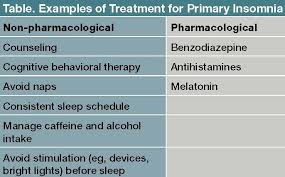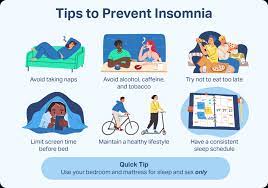Severe Insomnia Treatment: Strategies for Restful Sleep
Insomnia can be a debilitating condition that affects both physical and mental well-being. For individuals suffering from severe insomnia, finding effective treatment strategies is crucial to improving sleep quality and overall health.
Understanding Severe Insomnia
Severe insomnia is characterized by persistent difficulty falling asleep or staying asleep, leading to significant disruptions in daily functioning. This condition can have a profound impact on mood, cognitive performance, and overall quality of life.
Treatment Options
When it comes to treating severe insomnia, a multi-faceted approach is often necessary to address the underlying causes and promote restful sleep. Some common treatment strategies include:
- Cognitive Behavioral Therapy (CBT): CBT for insomnia focuses on changing negative thought patterns and behaviors that contribute to sleep disturbances. This therapy can help individuals develop healthy sleep habits and improve their overall sleep quality.
- Medication: In some cases, healthcare providers may prescribe medications to help manage severe insomnia symptoms. These medications should be used under the guidance of a medical professional and as part of a comprehensive treatment plan.
- Lifestyle Changes: Adopting healthy lifestyle habits such as maintaining a consistent sleep schedule, creating a relaxing bedtime routine, and avoiding stimulants like caffeine and electronics before bed can significantly improve sleep quality.
- Alternative Therapies: Practices such as mindfulness meditation, relaxation techniques, acupuncture, or yoga may also help reduce stress levels and promote better sleep for individuals with severe insomnia.
Seeking Professional Help
If you are struggling with severe insomnia, it is important to seek support from healthcare professionals who specialize in sleep disorders. A thorough evaluation can help identify underlying factors contributing to your insomnia and guide the development of an individualized treatment plan tailored to your needs.
Remember that effective treatment for severe insomnia may require patience and persistence. By working closely with your healthcare team and implementing targeted strategies for restful sleep, you can take proactive steps towards improving your well-being and reclaiming restorative rest.
Effective Strategies for Treating Severe Insomnia: From CBT to Professional Guidance
- 1. Cognitive Behavioral Therapy (CBT) for insomnia can help address underlying causes and improve sleep quality without the use of medication.
- 2. Medications prescribed for severe insomnia can provide short-term relief and support individuals in getting the rest they need to function better during the day.
- 3. Lifestyle changes recommended for severe insomnia treatment, such as maintaining a consistent sleep schedule, can lead to long-term improvements in sleep patterns.
- 4. Alternative therapies like mindfulness meditation or yoga offer natural and holistic approaches to managing stress and promoting relaxation for better sleep.
- 5. Seeking professional help for severe insomnia ensures personalized care and guidance from experts who specialize in treating sleep disorders.
6 Challenges in Treating Severe Insomnia: From Side Effects to Costs
- 1. Side effects of medication used to treat severe insomnia can include drowsiness, dizziness, and cognitive impairment.
- 2. Cognitive Behavioral Therapy (CBT) for insomnia may require a significant time commitment for therapy sessions and homework assignments.
- 3. Lifestyle changes recommended for improving sleep quality, such as maintaining a consistent sleep schedule, can be challenging to implement consistently.
- 4. Some individuals may not respond well to traditional treatment methods for severe insomnia, leading to frustration and feelings of hopelessness.
- 5. The cost of professional treatment for severe insomnia, including therapy sessions and medications, can be prohibitive for some individuals.
- 6. Alternative therapies suggested for managing severe insomnia may lack scientific evidence supporting their effectiveness in all cases.
1. Cognitive Behavioral Therapy (CBT) for insomnia can help address underlying causes and improve sleep quality without the use of medication.
Cognitive Behavioral Therapy (CBT) for insomnia stands out as a valuable treatment approach due to its ability to address the root causes of sleep disturbances and enhance sleep quality without relying on medication. By targeting negative thought patterns and behaviors that contribute to insomnia, CBT empowers individuals to develop healthier sleep habits and overcome obstacles to restful sleep. This non-pharmacological intervention not only offers sustainable results but also equips individuals with valuable skills to manage their sleep patterns effectively in the long term.
2. Medications prescribed for severe insomnia can provide short-term relief and support individuals in getting the rest they need to function better during the day.
Medications prescribed for severe insomnia can offer a valuable benefit by providing short-term relief to individuals struggling with sleep disturbances. These medications can help individuals achieve the rest they need to function better throughout the day, improving their overall cognitive performance, mood, and ability to engage in daily activities. By addressing acute sleep disruptions, these medications can offer a temporary solution while individuals work on implementing long-term strategies to manage their insomnia effectively.
3. Lifestyle changes recommended for severe insomnia treatment, such as maintaining a consistent sleep schedule, can lead to long-term improvements in sleep patterns.
Lifestyle changes recommended for severe insomnia treatment, such as maintaining a consistent sleep schedule, offer a promising avenue for long-term improvements in sleep patterns. By establishing a regular bedtime routine and waking schedule, individuals with severe insomnia can help regulate their body’s internal clock and promote better sleep quality over time. Consistency in sleep habits not only enhances the ability to fall asleep and stay asleep but also contributes to overall sleep efficiency and restorative rest, ultimately fostering sustainable improvements in sleep patterns and overall well-being.
4. Alternative therapies like mindfulness meditation or yoga offer natural and holistic approaches to managing stress and promoting relaxation for better sleep.
Alternative therapies such as mindfulness meditation and yoga provide natural and holistic solutions for individuals seeking to manage stress and enhance relaxation to improve their sleep quality. By incorporating these practices into their daily routine, individuals with severe insomnia can benefit from reduced stress levels, increased mindfulness, and a greater sense of calmness, ultimately paving the way for a more restful and rejuvenating sleep experience.
5. Seeking professional help for severe insomnia ensures personalized care and guidance from experts who specialize in treating sleep disorders.
Seeking professional help for severe insomnia ensures personalized care and guidance from experts who specialize in treating sleep disorders. These professionals have the knowledge and experience to conduct a thorough evaluation, identify underlying causes of insomnia, and tailor a treatment plan specifically to address individual needs. By entrusting your care to specialists in sleep disorders, you can benefit from their expertise in implementing effective strategies to improve sleep quality and overall well-being.
1. Side effects of medication used to treat severe insomnia can include drowsiness, dizziness, and cognitive impairment.
One significant drawback of using medication to treat severe insomnia is the potential for experiencing side effects. Common side effects of medications prescribed for insomnia, such as drowsiness, dizziness, and cognitive impairment, can significantly impact daily functioning and quality of life. These effects may interfere with activities that require alertness and concentration, potentially posing safety risks for individuals who need to operate machinery or drive vehicles. Moreover, the presence of these side effects can lead to dependency on medication for sleep, which may not address the underlying causes of insomnia and could result in long-term reliance on pharmaceutical intervention.
2. Cognitive Behavioral Therapy (CBT) for insomnia may require a significant time commitment for therapy sessions and homework assignments.
One drawback of Cognitive Behavioral Therapy (CBT) for insomnia as a treatment for severe insomnia is the substantial time commitment it may entail. Engaging in CBT sessions and completing homework assignments as part of the therapy process can demand a significant investment of time and effort from individuals seeking relief from their sleep disturbances. This commitment to regular therapy sessions and consistent practice of prescribed techniques may pose challenges for those with busy schedules or limited availability, potentially hindering their ability to fully benefit from the therapeutic approach.
3. Lifestyle changes recommended for improving sleep quality, such as maintaining a consistent sleep schedule, can be challenging to implement consistently.
One significant drawback of severe insomnia treatment involving lifestyle changes is the difficulty in consistently implementing recommendations aimed at improving sleep quality. Maintaining a consistent sleep schedule, establishing a relaxing bedtime routine, and avoiding stimulating activities before sleep can be challenging for individuals grappling with severe insomnia. Factors such as work demands, family responsibilities, or fluctuating stress levels may hinder the ability to adhere to these lifestyle changes on a regular basis, making it harder to establish sustainable habits that promote restful sleep.
4. Some individuals may not respond well to traditional treatment methods for severe insomnia, leading to frustration and feelings of hopelessness.
Some individuals may not respond well to traditional treatment methods for severe insomnia, leading to frustration and feelings of hopelessness. Despite efforts to address their sleep disturbances through cognitive behavioral therapy, medication, lifestyle changes, or alternative therapies, some individuals may find that their insomnia remains resistant to treatment. This lack of response can be disheartening and challenging, as it may exacerbate feelings of helplessness and despair in those seeking relief from their debilitating sleep disorder. Additional support and tailored interventions may be necessary for individuals who do not experience improvement with conventional approaches to severe insomnia treatment.
5. The cost of professional treatment for severe insomnia, including therapy sessions and medications, can be prohibitive for some individuals.
The cost of professional treatment for severe insomnia, including therapy sessions and medications, can be prohibitive for some individuals. Accessing specialized care for severe insomnia often comes with a financial burden that may deter individuals from seeking the help they need. The expenses associated with therapy sessions, medication prescriptions, and ongoing treatment can add up quickly, creating barriers to effective management of severe insomnia for those with limited financial resources. This con highlights the importance of considering affordable alternatives and exploring options for financial assistance to ensure that all individuals have access to comprehensive and sustainable treatment for severe insomnia.
6. Alternative therapies suggested for managing severe insomnia may lack scientific evidence supporting their effectiveness in all cases.
One significant drawback of relying on alternative therapies for managing severe insomnia is the potential lack of scientific evidence supporting their effectiveness in all cases. While practices like mindfulness meditation, acupuncture, or yoga are often promoted as natural remedies for improving sleep quality, the empirical research backing their efficacy in treating severe insomnia may be limited or inconclusive. This lack of robust scientific validation can make it challenging for individuals seeking alternative approaches to feel confident in the reliability and consistency of these methods as standalone treatments for severe insomnia.



